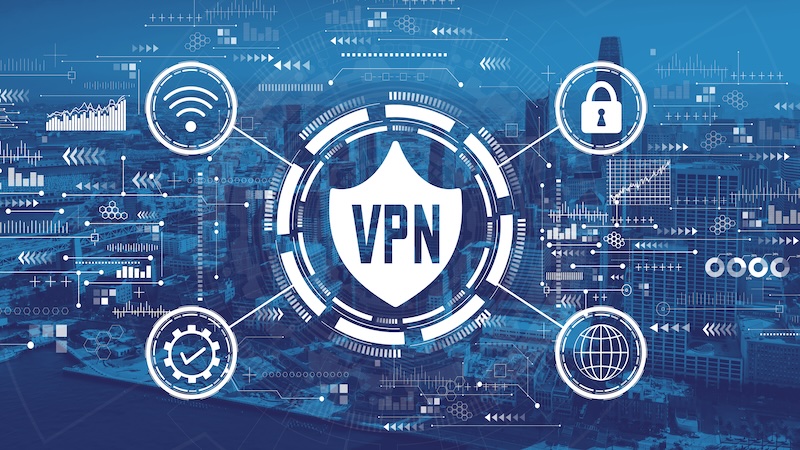
A virtual private network is a virtual, non-public network. It makes it possible to establish a protected and encrypted connection between two endpoints over the Internet. But how exactly does a VPN actually work?
VPN stands for “Virtual Private Network”. This is a virtual network that enables the establishment of an encrypted and protected connection. Technically speaking, a VPN works like an encrypted tunnel through which a provider routes an Internet connection. When you activate a VPN, your data is sent through a VPN server before reaching its final destination.
Without a VPN, your device sends data directly to the internet, such as websites like Google. Your IP address remains visible to your Internet provider and potentially others who are in the path between you and Google. However, when you use a VPN, your ISP can no longer directly see where your data is going. Instead, it only sees that you are connected to the VPN server. Everything else hides an additional layer of encryption.
How does a VPN work?
When you visit a website like Google without a VPN, you usually send a so-called “SYN packet” from your device to the Google server. This process tells the server that you want to establish a connection. Your ISP can see all of these data packets and even inspect their contents if you’re not using an encrypted site (like HTTPS).
However, if you use a VPN, this process is a little different. Because the network encrypts the original data packet, packs it into another packet and then sends it to the VPN server. This decrypts the packet, forwards it to the actual destination server and responds in the opposite direction. This means that the VPN server plays the intermediary between you and the target server.
Internet provider only sees VPN server address
Your ISP only sees that you are connected to the VPN server, but not that you have accessed Google, for example. One of the biggest benefits of a VPN is that it hides your IP address. This can help you protect your online privacy or access content blocked in certain regions.
Because the VPN provider routes your internet traffic through a VPN server, websites and services cannot see your real IP address, only that of the VPN server. However, a VPN is not a panacea.
Because while it encrypts and anonymizes traffic, it cannot decrypt the contents of encrypted connections such as HTTPS. This means that even the VPN provider cannot access the data transmitted through secure connections.
VPN reduces internet speed
However, using a VPN also has disadvantages. For example, you may experience slightly reduced internet speeds as components encrypt and decrypt the data twice. Still, a VPN is a powerful tool for protecting online privacy.
However, it is important to understand that it does not provide absolute security and does not protect every type of online connection or data traffic. Nevertheless, such a network can help you surf the Internet more safely and anonymously – especially if you are on public networks or want to circumvent geoblocking.
Also interesting:
- How does Telegram’s end-to-end encryption work?
- How does WhatsApp end-to-end encryption work?
- More control for parents: This is how the teen account works on Instagram
- How does a quantum computer actually work?
The article How does Virtual Private Network (VPN) actually work? by Felix Baumann first appeared on BASIC thinking. Follow us too Facebook, Twitter and Instagram.
As a tech industry expert, I understand that a Virtual Private Network (VPN) works by creating a secure and encrypted connection between a user’s device and a remote server. This allows the user to access the internet through the server, effectively masking their IP address and location.
When a user connects to a VPN server, their internet traffic is encrypted and sent through a secure tunnel. This prevents third parties, such as hackers or government agencies, from intercepting and monitoring the user’s online activities.
Additionally, VPNs can also be used to access geo-restricted content by allowing users to connect to servers in different locations around the world. This can be particularly useful for individuals looking to bypass censorship or access streaming services that are only available in certain regions.
Overall, VPNs provide users with increased privacy, security, and freedom online. However, it is important to choose a reputable VPN provider to ensure that your data is truly protected.
Credits